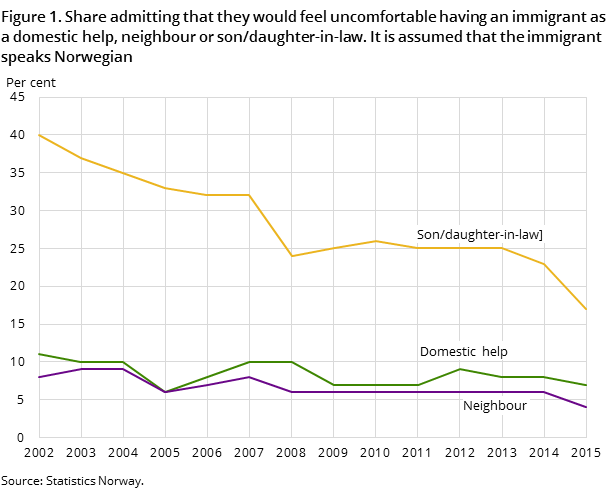Content
Published:
This is an archived release.
Greater acceptance of inter-cultural marriage
Fewer people than before would find it uncomfortable if their son or daughter wanted to marry an immigrant. While 25 and 23 per cent had objections to this in 2013 and 2014 respectively, only 17 per cent expressed similar reluctance in 2015. In 2002, the figure was 40 per cent.
| 2006 | 2014 | 2015 | |
|---|---|---|---|
| Most immigrants make an important contribution to Norwegian working life | |||
| Strongly agree | 26 | 32 | 30 |
| Agree on the whole | 46 | 45 | 42 |
| Disagree on the whole | 12 | 9 | 7 |
| Strongly disagree | 5 | 3 | 3 |
| Most immigrants enrich the cultural life in Norway | |||
| Strongly agree | 31 | 36 | 36 |
| Agree on the whole | 37 | 33 | 35 |
| Disagree on the whole | 13 | 13 | 8 |
| Strongly disagree | 7 | 5 | 6 |
| Most immigrants are a cause of insecurity in society | |||
| Strongly agree | 14 | 9 | 7 |
| Agree on the whole | 27 | 19 | 19 |
| Disagree on the whole | 28 | 31 | 30 |
| Strongly disagree | 18 | 29 | 27 |
| Attitudes towards refugees' and asylum seekers' access to residence permits in Norway. Compared to today, should it be easier, more difficult or remain the same as today? | |||
| Easier | 7 | 18 | 15 |
| As today | 46 | 50 | 50 |
| More difficult | 45 | 28 | 29 |

This is one of the findings in the annual population survey of attitudes towards immigrants and immigration conducted by Statistics Norway between 6 July and 15 August this year.
Only 7 per cent said they would find it embarrassing if they or someone in their immediate family were to get domestic help from an immigrant, and 4 per cent disliked the idea of having an immigrant as a neighbour. This is the same as in earlier years.
Unchanged attitudes towards reception of refugees
On a question about the reception of refugees and asylum seekers, 15 per cent think it should be easier to get a residence permit in Norway. Fifty per cent think that access to permanent residence should be “the same as today”, while 29 per cent think it should be more difficult. This is almost the same as in 2014, when the share who thought it should be easier to get a residence permit increased from 7 to 18 per cent. The present survey was conducted in July and August, when the number of asylum seekers was considerably lower than in the autumn.
Other attitudes also remain the same
In other questions about immigrants and their performance in society, the population’s reactions in 2015 do not differ significantly from last year: 73 per cent agree strongly or on the whole that ‘most immigrants make an important contribution to Norwegian working life’ (11 per cent disagreed), 72 per cent agree that ‘most immigrants enrich the cultural life in Norway’ (14 per cent disagreed), 52 per cent disagree that ‘most immigrants abuse the social welfare system’ (25 per cent agreed), and 57 per cent disagree that ‘most immigrants represent a source of insecurity in society’ (26 per cent agreed). Moreover, 87 per cent agree strongly or on the whole that ‘all immigrants in Norway should have the same job opportunities as Norwegians’ (8 per cent disagreed). The economic turnaround in the wake of the falling oil prices has apparently not led to a change in attitudes on these matters.
More people claim to have contact with immigrants
There is also an increase of 8 percentage points in the share having contact with immigrants. This share is now 78 per cent; the same as in 2013 following a divergent fall in the preceding year’s survey. The most common form of contact is through work and among friends and acquaintances. Those who have contact with immigrants also report that the contact is slightly more frequent than before. The share who have daily or weekly contact is 87 per cent; 6 percentage points higher than in 2014.
Varying attitudes according to background factors
Women are usually somewhat more liberal or positive towards immigrants and immigration than men. The most elderly (67-79 years) are more sceptical, while the most immigrant-friendly are either the youngest (16-24 years) or those slightly older (25-44 years) depending on the topic. The more immigrant-friendly groups also include those with a higher education, those who have contact with immigrants, and persons living in the most urban areas (more than 100 000 inhabitants). Persons with an immigrant background, especially from Europe and North America, also tend to be more positive, however this group only makes up 6 per cent of the sample.
Purpose of the surveyOpen and readClose
Statistic Norway’s annual survey on attitudes towards immigrants and immigration is conducted on behalf of the Ministry of Justice and Public Security. The aim is to reflect the sentiment of the population with regard to various aspects of the country’s immigration and refugee policy and towards immigrants as a group.
Contact
-
Frøydis Strøm
E-mail: froydis.strom@ssb.no
tel.: (+47) 40 81 13 17
-
Christian Sørlien Molstad
E-mail: christian.molstad@ssb.no
tel.: (+47) 46 65 99 12
